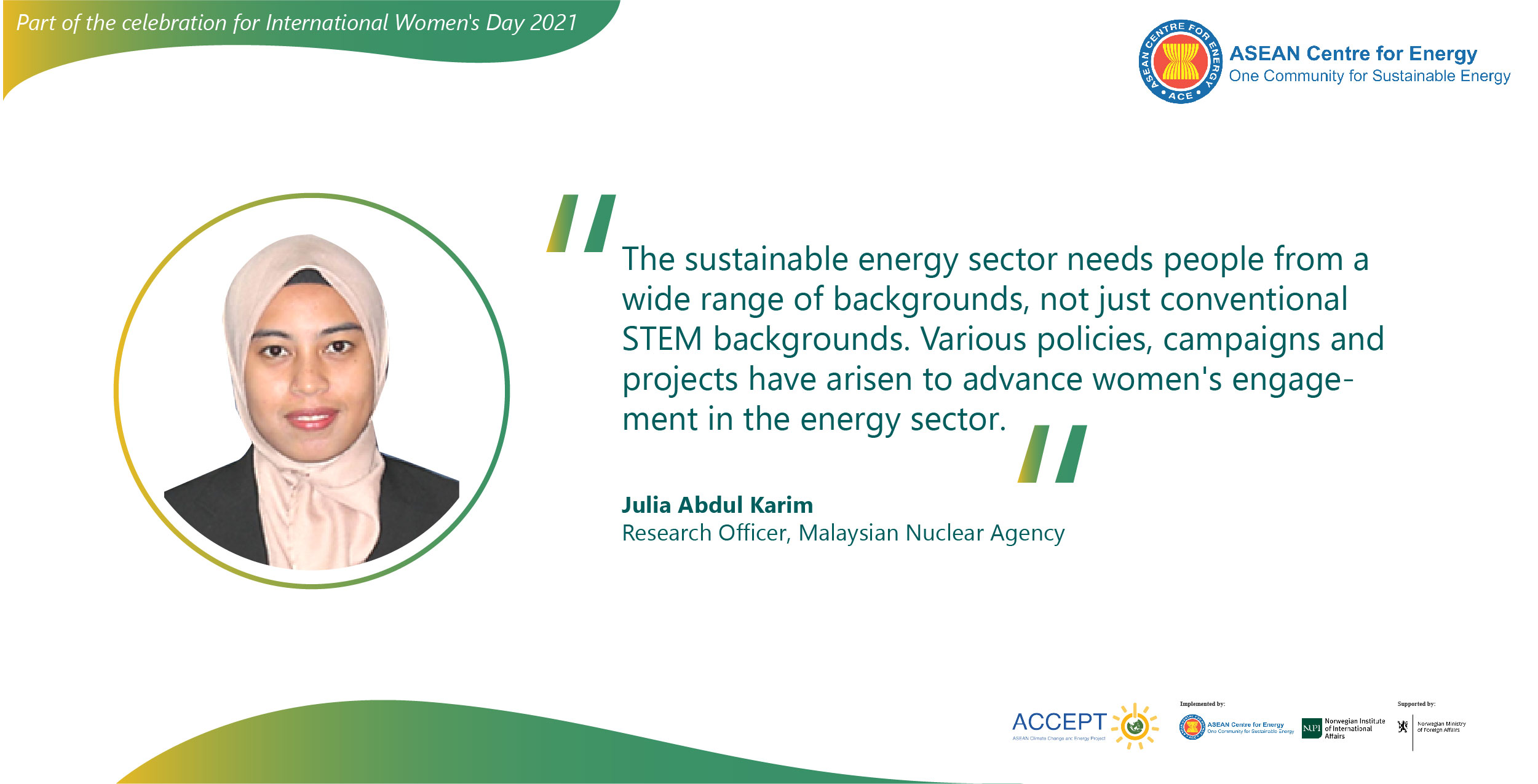Menu
From Malaysia, Julia Abdul Karim, D.Eng, Research Officer; Malaysian Nuclear Agency, gave her perspective on women in the Energy-Climate.

Hi, my name is Julia Abdul Karim. I worked at the Malaysian Nuclear Agency as a Research Officer and was attached to the Technical Support Division. My responsibility as a Reactor Manager is to ensure reactor utilization for peaceful use and comply with all safety, security, and safeguard regulations. Although the reactor is purposely for research and development activities, it is also used to understand nuclear energy matters and its related technologies. The basics principle in generating power from nuclear is to convert the heat generated by the fission reaction to the energy form. The choice of technologies is varied and gives a broader selection to engage in nuclear energy without neglecting its safety features. Without any prejudice, the nuclear field is a male-dominated orientation; however, women’s opportunities to get involved in this area are exceptional.
We have seen many success stories that have been told about women’s achievement in the energy transition as comparable to the men. Madame Marie Curie has been awarded two Nobel Prizes in two distinct fields, i.e., Chemistry and Physics, because of her enormous discovery in radioactivity and championed in x-ray development. She is a legendary, very successful figure in countless findings related to energy use in a male-dominant area. Whilst in 2020, three women were awarded Nobel Prizes in Physics and Chemistry, adding more to the Nobel laureates list. Those successful ones became aspirational to other women to work in a male-dominated environment.
In this new challenging working atmosphere, women’s role in the energy transition has changed dramatically. Women were perceived as handier, sturdy, capable, competent, and sometimes they could raise a smart solution when efficiently using energy in daily life. Naturally, women are more delicate, gentle details when tackling some energy issues because they analyze from different perspectives.
While gender equality in the workforce has made improvements over the past several decades, there is still an apparent disparity of women in leadership in the energy sector. Some argue it is a top-down issue in which male-dominated leadership structures do not commit to putting women in high-power positions. But this is not necessarily true.
With a recent study by the Peterson Institute for International Economics showing the bottom-line benefits of a gender-diverse workforce, many companies are eager to address the problem. Women have a lot to contribute to the energy sector, particularly during times of transition. In other industries, scientific research has discovered that a diverse workforce generates better outcomes, not only in terms of increased creativity and growth capacity but also in terms of better decision-making and greater profits. According to preliminary research results, businesses with more women on their board of directors are more likely to invest in renewable energy generation, combat climate change, and resolve environmental issues proactively.
The sustainable energy sector needs people from a wide range of backgrounds, not just conventional STEM backgrounds. Various policies, campaigns and projects have arisen to advance women’s engagement in the energy sector.
IRENA has also given a list of women in energy networks and partnerships acting internationally, regionally and nationwide. In addition to networks and alliances, many global and national campaigns have been set up to support women and expand their engagement in the sustainable energy sector.
In general, some actions and measures can be adopted by all parties, as well as tailored guidelines for international organizations, government and business groups, businesses and individuals. Evidence suggests that what is positive and reasonable for women and diverse cultures is also suitable for men, their economies, their families and their communities. Therefore, we must admit the significant roles of women in the sustainable energy sectors.
Happy Women’s Day,
Julia
Disclaimer: The opinions, beliefs and viewpoints expressed are solely my own and do not necessarily reflect the official policy, opinion, beliefs and viewpoints nor the position of my institution.
